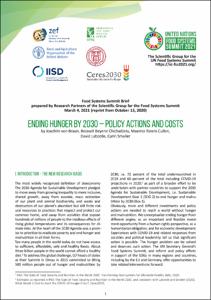Ending Hunger by 2030 – policy actions and costsFood Systems Summit Brief prepared by Research Partners of the Scientific Group for the Food Systems Summit March 4, 2021 (reprint from October 13, 2020)

Ending Hunger by 2030 – policy actions and costs
Food Systems Summit Brief prepared by Research Partners of the Scientific Group for the Food Systems Summit March 4, 2021 (reprint from October 13, 2020)

| dc.contributor.author | von Braun, Joachim | |
| dc.contributor.author | Chichaibelu, Bezawit Beyene | |
| dc.contributor.author | Torero Cullen, Maximo | |
| dc.contributor.author | Laborde, David | |
| dc.contributor.author | Smaller, Carin | |
| dc.date.accessioned | 2021-06-14T21:59:14Z | |
| dc.date.available | 2021-06-14T21:59:14Z | |
| dc.date.issued | 04.03.2021 | |
| dc.identifier.uri | https://hdl.handle.net/20.500.11811/9161 | |
| dc.description.abstract | The most widely recognized definition of bioeconomy The 2030 Agenda for Sustainable Development pledged to move away from growing inequality to more inclusive, shared growth, away from ecocide, mass extinction of our plant and animal biodiversity, and waste and destruction of our planet’s abundant but still finite natural resources to practices that respect and protect our common home, and away from activities that expose hundreds of millions of people to the insidious effects of rising global temperatures and its consequences for cli- mate risks. At the heart of the 2030 Agenda was a promise to prioritize to eradicate poverty and end hunger and malnutrition in all their forms. Too many people in the world today do not have access to sufficient, affordable, safe and healthy foods. About three billion people in the world cannot afford a healthy diet.1 To address this global challenge, G7 heads of states at their Summit in Elmau in 2015 committed to lifting 500 million people out of hunger and malnutrition by 2030, i.e. 72 percent of the total undernourished in 2019 and 60 percent of the total including COVID-19 projections in 2020,2 as part of a broader effort to be undertaken with partner countries to support the 2030 Agenda for Sustainable Development, i.e. Sustainable Development Goal 2 (SDG 2) to end hunger and malnutrition by 2030 (Box 1).
Obviously, more and different investments and policy actions are needed to reach a world without hunger and malnutrition. We conceptualize ending hunger from different angles: as an important and feasible investment opportunity from a human rights perspective, as a humanitarian obligation, and for economic development. Experiences with COVID-19 and related responses from societies and political leadership tell us that significant action is possible. The hunger problem can be solved and deserves such action. The UN Secretary General’s Food Systems Summit, and reform and policy efforts in support of the SDGs in many regions and countries, including by the EU and Germany, offer opportunities to take related interventions forward. This policy brief is a call to action from the research community to not only address the problems of hunger, malnutrition and poverty, but to actually act and invest and adapt policies to reach SDG 2 by 2030. | en |
| dc.format.extent | 8 | |
| dc.language.iso | eng | |
| dc.rights | In Copyright | |
| dc.rights.uri | http://rightsstatements.org/vocab/InC/1.0/ | |
| dc.subject | Food security | |
| dc.subject | Nutrition | |
| dc.subject | Sustainable agriculture | |
| dc.subject | Bioeconomy | |
| dc.subject.ddc | 300 Sozialwissenschaften, Soziologie, Anthropologie | |
| dc.title | Ending Hunger by 2030 – policy actions and costs | |
| dc.title.alternative | Food Systems Summit Brief prepared by Research Partners of the Scientific Group for the Food Systems Summit March 4, 2021 (reprint from October 13, 2020) | |
| dc.type | Wissenschaftlicher Artikel | |
| dc.identifier.doi | https://doi.org/10.48565/scfss2021-kz31 | |
| dc.publisher.name | Center for Development Research (ZEF) in cooperation with the Scientific Group for the UN Food System Summit 2021 | |
| dc.publisher.location | Bonn | |
| dc.rights.accessRights | openAccess | |
| dc.relation.url | http://sc-fss2021.org/wp-content/uploads/2021/04/FSS_Brief_End_Hunger_SDG2_Actions_Costs.pdf | |
| ulbbn.pubtype | Zweitveröffentlichung | |
| dc.version | updatedVersion |
Files in this item
This item appears in the following Collection(s)
-
FSS Briefs by Partners of Scientific Group (41)
"Food Systems Summit Briefs" are invited papers by the Scientific Group in support of the Summit agenda setting.




